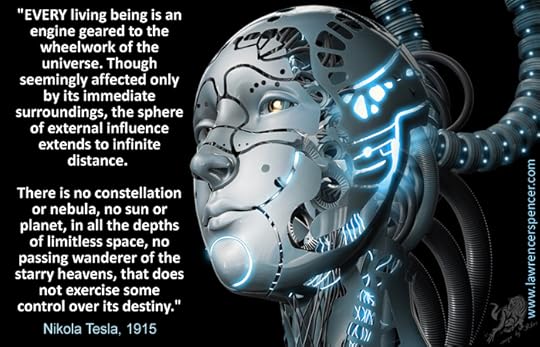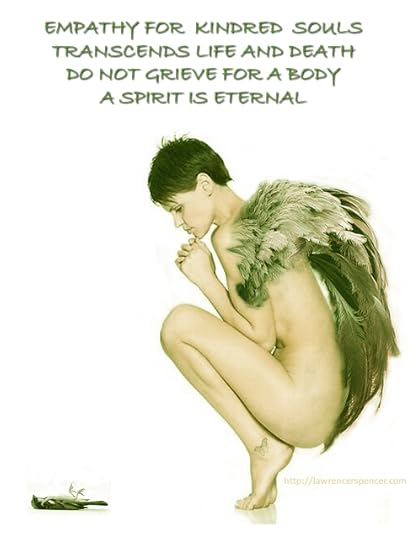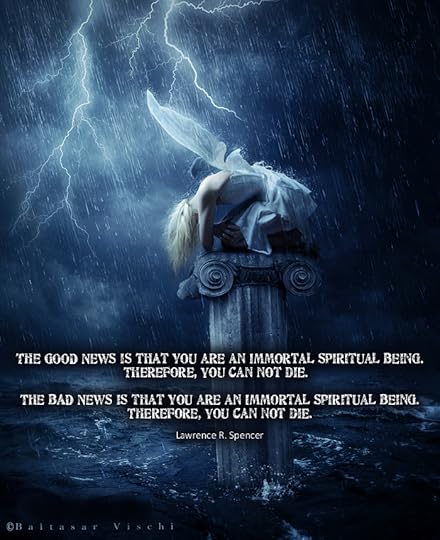Lawrence R. Spencer's Blog, page 144
August 18, 2021
LOVE SURVIVES
Republished by Blog Post Promoter
 “The ancient Sanskrit legends speaks of a destined love, a karmic connection between souls that are fated to meet and collide and enrapture one another. The legends say that the loved one is instantly recognized because she’s loved
“The ancient Sanskrit legends speaks of a destined love, a karmic connection between souls that are fated to meet and collide and enrapture one another. The legends say that the loved one is instantly recognized because she’s loved  in every gesture, every expression of thought, every movement, every sound, and every mood that prays in her eyes. The legends say that we know her by her wings–the wings that only we can see–and because wanting her kills every other desire of love.
in every gesture, every expression of thought, every movement, every sound, and every mood that prays in her eyes. The legends say that we know her by her wings–the wings that only we can see–and because wanting her kills every other desire of love.
The same legends also carry warnings that such fated love may, sometimes, be the possession and the obsession of one, and only one, of two souls twinned by destiny. But wisdom in one sense, is the opposite of love. Love survives in us precisely because it isn‘t wise.”
~ from the book Shantaram by Gregory Roberts ~
POSSIBILITIES
Republished by Blog Post Promoter
 Mohandas Karamchand Gandhi (; 2 October 1869 – 30 January 1948) was the preeminent leader of Indian independence movement in British-ruled India. Employing nonviolent civil disobedience, Gandhi led India to independence and inspired movements for civil rights and freedom across the world. The term Indian Independence Movement encompasses activities and ideas aiming to end first the company rule (East India Company), and then the rule of the British.
Mohandas Karamchand Gandhi (; 2 October 1869 – 30 January 1948) was the preeminent leader of Indian independence movement in British-ruled India. Employing nonviolent civil disobedience, Gandhi led India to independence and inspired movements for civil rights and freedom across the world. The term Indian Independence Movement encompasses activities and ideas aiming to end first the company rule (East India Company), and then the rule of the British.
Mohandas Gandhi’s storied history of resistance included many stints in jail, starting with a two-month imprisonment in 1907 in South Africa, where he was working to end discrimination against Indians living there. He was arrested for urging them to ignore a law requiring Indians to be registered and fingerprinted. While in jail, Gandhi read Henry David Thoreau’s “Civil Disobedience”, which would become a major part of his philosophy upon his return to India. Back in his home country, Gandhi was put behind bars several times for his movement to end British rule. In 1922 he was tried for the last time by the British government for “bringing or attempting to excite disaffection towards His Majesty’s Government established by law in British India.” He pleaded guilty to all charges and was sentenced to six years, of which he served two before being released for an emergency appendectomy. India achieved independence on Aug. 15, 1947, five months before Gandhi was assassinated.
Gandhi preached rebellion, launched mass civil disobedience and was repeatedly jailed. When arrested, he pleaded guilty and asked for the severest punishment. In South Africa, the charge against him and his co-workers was proved by witnesses furnished by him. The horror, shame and hardship of jail life, originally a punishment allotted to criminals, scared the Indians. Gandhi removed this fear from their hearts. He was jailed eleven times. Once he was arrested three times within four days. If he had to complete all his jail terms, he would have spent 11 years and 19 days in jail. Occasionally his punishment was reduced and and he altogether spent 6 years and 10 months in prison. At the age of 39, he first entered a jail. He came out of the prison gates for the last time when he was 75.
On 14 and 15 August 1947 the Indian Independence Act was invoked.
August 17, 2021
MAN AS A MACHINE
Republished by Blog Post Promoter
From an article published in the RICHMOND TIMES-DISPATCH, February 21, 1915, By Mr. Nikola Tesla
“EVERY living being is an engine geared to the wheelwork of the universe. Though seemingly affected only by its immediate surroundings, the sphere of external influence extends to infinite distance. There In no constellation or nebula, no sun or planet, in all the depths of limitless space, no passing wanderer of the starry heavens, that does not exercise some control over its destiny. Not in the vague and delusive sense of astrology, but in the rigid and positive meaning of physical science.
More than this can be said. There is no thing endowed with life — from man, who is enslaving the element to the humblest creature in all this world — that does not sway it in turn. Whenever action is born from force, though it be infinitesimal, the cosmic balance is upset and universal motion results.”
MAN AS A MACHINE
Great strides have since been made in the art of anatomy, physiology and all branches of science, and the workings of the man-machine are now perfectly clear. Yet the very fewest among us are able to trace their actions to primary external causes. It is indispensable to the arguments I shall advance to keep In mind the main facts which I have myself established in years of close reasoning and observation and which may be summed up as follows:
1. The human being is a self-propelled automaton entirely under the control of external influences. Willful and predetermined though they appear, his actions are governed not from within, but from without. He is like a float tossed about by the waves of a turbulent sea.
2. There is no memory or retentive faculty based on lasting impression. What we designate as memory is but increased responsiveness to repeated stimuli.
3. It is not true, as Descartes taught, that the brain is an accumulator. There is no permanent record in the brain, there Is no stored sponge to disturbances directly received on the knowledge. Knowledge Is something akin to an echo that needs a disturbance to be called into being.”
August 16, 2021
HUMAN SYMBIOSIS
Republished by Blog Post Promoter
On a tiny, remote planet a Mythology has been conceived and taught that one relatively minor species of life form are “superior” to billions of others with whom they share the planet, and upon whom they depend for sustenance. Factually, all life forms exist in a perpetual state of interactive interdependency called “symbiosis”.
Symbiosis comes from two Greek words that means “with” and “living.” It describes a close relationship between two organisms from different species. It is sometimes, but not always, beneficial to both parties. Ironically, the life form that is NOT required for symbiotic survival on Earth, and without which the planet flourished for billions of years, is the species “homo sapiens”.
If insects or bacteria (two small examples) disappeared from Earth, most other species, including homo sapiens, would perish quickly. However, if homo sapiens became extinct, nearly all other life forms would flourish, and return to a natural state of symbiotic abundance upon which the fragile, parasitic species of homo sapiens depends utterly. With the exception of a few domesticated animals humans would not be missed on Earth.
It has been observed that the Microcosm (relatively small) is a reflection of the Macrocosm (relatively large) in the physical universe. Human beings conceive themselves to be the “highest” form of life and most intelligent. Yet, when viewed in the context of stars, galaxies and universes, homo sapiens are infinitesimally insignificant, except in their own minds. This begs the question: “Are their beings in the universe for whom humans might provide symbiotic value?“ The final scene from the popular film Men In Black offers one example. Do humans exist symbiotically in an existential game played by beings who we make imperceptible by our Narcissistic Mythology?
August 15, 2021
THE CYNIC
Republished by Blog Post Promoter
“The cynic is one who never sees a good quality in a man, and never fails to see a bad one. He is the human owl, vigilant in darkness and blind to light, mousing for vermin, and never seeing noble game. The cynic puts all human actions into two classes–openly bad and secretly bad. All virtue and generosity and disinterestedness are merely the appearance of good; but selfish at the bottom. He holds that no man does a good thing except for profit. The effect of his conversation upon your feelings is to chill and sear them; to send you away sour and morose. His criticisms and hints fall indiscriminately upon every lovely thing, like frost upon flowers.” – Henry Ward Beecher“Cynicism may not be a lovely, warm and fuzzy view of reality, but neither is birth, disease, war, greed, cruelty, madness, murder, insanity, starvation, murder, chaos and death.” – Lawrence R. SpencerGeorge Carlin was one of the greatest, and most famous, cynics of all time. I’d say “god rest his soul”, but he didn’t believe in “god(s), so I’ll just say “see ya!”.
August 14, 2021
GOOD NEWS, BAD NEWS
Republished by Blog Post Promoter
The GOOD News is that You are an Immortal Spiritual Being. Therefore, you can not die.
The BAD News is that You are an Immortal Spiritual Being. Therefore, you can not die.
Lawrence R. Spencer









